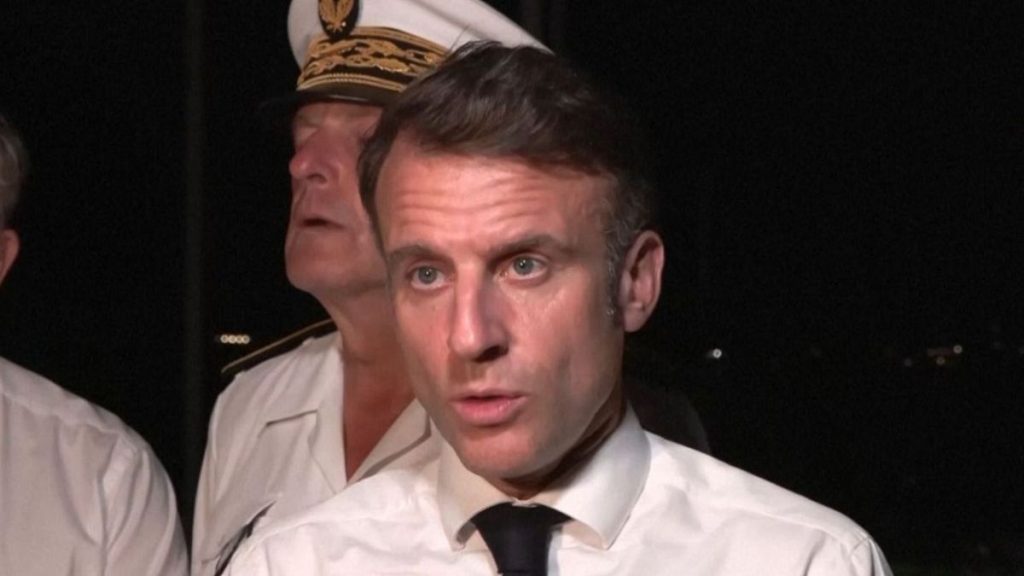The French overseas department of Mayotte, nestled in the Indian Ocean, was recently ravaged by Cyclone Chido, leaving a trail of destruction and sparking a volatile political confrontation during French President Emmanuel Macron’s visit. The cyclone, which struck the island on Saturday, inflicted widespread damage on infrastructure and homes, leaving a death toll officially at 31, though fears persist that the actual number of fatalities could be significantly higher, potentially reaching into the thousands. This catastrophe has unfolded against a backdrop of existing tensions between Mayotte and mainland France, stemming from perceived inadequacies in the island’s infrastructure and resource allocation, particularly concerning water and electricity supplies.
Macron’s arrival on the island was intended as a gesture of support and solidarity, aimed at assessing the damage firsthand and reassuring the affected population. However, his presence was met with immediate hostility from residents, many of whom were still struggling without basic necessities such as food, water, and electricity days after the cyclone. Their anger, fueled by the perceived slowness and inadequacy of the government’s response, erupted into protests and heckling, with chants of “resign” echoing through the crowds. The president’s attempts to address the concerns and defend the government’s efforts were met with further resistance and accusations of downplaying the scale of the disaster.
The situation escalated when, during an exchange with residents, Macron made a series of controversial remarks that further inflamed the already tense atmosphere. He questioned the loyalty and gratitude of the islanders, suggesting that they should appreciate being part of France, as their situation would be drastically worse otherwise. This comparison, along with his assertion that France’s aid response was superior to any other in the region, was perceived as insensitive and dismissive by many, further alienating the residents who felt their plight was being minimized. The president’s comments, intended to highlight the government’s commitment, instead became the focal point of public outrage, overshadowing his efforts to address the crisis.
The repercussions of Macron’s visit extended beyond the shores of Mayotte, sparking a political firestorm back in mainland France. Opposition politicians seized upon his remarks, characterizing them as insensitive and disrespectful to the victims of the cyclone. Left-wing MP Alma Dufour condemned Macron for allegedly humiliating the families of the deceased, while Green MP Sandrine Rousseau criticized the president for prioritizing his own image over the gravity of the humanitarian crisis. These criticisms reflect a broader sentiment of discontent with the government’s handling of the situation, adding to the pressure on Macron to address the growing humanitarian crisis effectively.
The cyclone and its aftermath have exposed deep-seated tensions between Mayotte and mainland France, highlighting the island’s vulnerability and its dependence on external support. The residents’ frustration, exacerbated by the perceived inadequacy of the government’s response, underscores a sense of disconnect between the island and the mainland, further fueled by the president’s controversial remarks. The political fallout from Macron’s visit has intensified the scrutiny on the government’s handling of the crisis, demanding a more comprehensive and compassionate approach to address the immediate needs of the affected population and the underlying issues that contribute to Mayotte’s vulnerability.
Moving forward, the focus must shift from political rhetoric to tangible action. The immediate priority is to provide comprehensive relief and support to the residents of Mayotte, addressing their urgent needs for shelter, food, water, and medical assistance. Beyond the immediate crisis, a long-term strategy is required to strengthen Mayotte’s infrastructure, improve its resilience to natural disasters, and address the underlying socio-economic challenges that contribute to its vulnerability. This necessitates a collaborative approach, involving the French government, local authorities, and international aid organizations, to ensure a sustainable and equitable recovery for the island and its people. The cyclone’s aftermath has presented a crucial opportunity to re-evaluate the relationship between Mayotte and mainland France, fostering a stronger sense of partnership and mutual understanding to ensure a more secure and prosperous future for the island.














